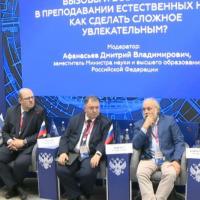Today, within the framework of the XXVIII St. Petersburg International Economic Forum, an expert session organized by the Ministry of Education and Science of the Russian Federation "Challenges and Opportunities in teaching natural Sciences. How to make complex things exciting?", which was addressed by Vladimir Shevchenko, Rector of the National Research Nuclear University MEPhI.
The panelists discussed such difficult issues as the popularization of mathematics and natural sciences, key changes that should take place in the teaching of physics and other natural science disciplines, the number of budget places at technical universities, and attracting the best applicants to engineering specialties.
In his speech, the Rector of MEPhI gave interesting figures. More than 1,200,000 applicants come to Russian technical universities, about half of them go to the budget, and about 60,000 are distributed among the country's leading universities. At the same time, the layer of strong, "top" applicants, winners of the Olympics, is very narrow and makes up no more than 10% of those who find themselves in budget places. According to Vladimir Shevchenko, these guys are not inferior to their peers from China, the USA, and Europe in terms of training. And here we come to the issue of communication. Is the educational system ready to interact with the most talented and ambitious applicants? Is it possible to make learning more individualized?
"At the core of education is the act of communication between a teacher and a student, a professor and a student, a person who has something to say and a person who is ready to accept what is said. Everything else is a shell, a frame of this act. If there is no communication, core, or content, then everything else is meaningless," the rector believes.
According to Vladimir Shevchenko, the division of the education system into "conditional zones" – secondary, higher, graduate, and postgraduate – will become less important over time. After all, the educational trajectory of a specialist should be continuous and almost seamless. The education of an engineer starts around the fifth grade, when a child finishes playing Lego and becomes interested in robotics, and ends after 20 years, when he is ready to take on responsibility by participating in large projects as a chief engineer or general designer. "This is the age between 35 and 40, when both Kurchatov and Oppenheimer, if we talk about the history of the nuclear industry, became heads of relevant projects," the rector added.
Schoolteachers are able to interest children in science. However, only those of them who sincerely love their subjects. MEPhI, the speaker noted, is doing a lot to ensure that there are more such teachers. For example, the university has organized and is holding the League of the Best Olympiad for school Physics teachers for the second year, which helps to encourage the most interested, creative, professional teachers, inspires their colleagues, and improves the quality of physics teaching at school.
It is equally important that university education meets modern requirements.
"For a modern engineer, any engineering process, whether it is design, modeling, construction, operation, modernization, or disposal of any system, takes place simultaneously in the physical space and in the digital space. And a modern specialist should understand well how the connections between them work, where it is possible to make a numerical experiment, where, on the contrary, in no case can he be trusted," said Vladimir Shevchenko.
The Rector of MEPhI also elaborated on the problems that a young specialist may face in the labor market. Science, if it is a real science, and not an imitation of it, requires from people who are on its frontier an extremely lot of effort, the most difficult work, and sometimes complete dedication. Meanwhile, technology companies often do not have a "request for complexity" and for specialists who understand complex things. According to the rector, "sometimes you hear that employers don't need super–athletes - they have psychological problems with burnout, big demands, everyone wants to "cheat" them, it's much more convenient to have strong middle-class people who will solve specific tasks facing the company."
Such a position, Vladimir Shevchenko is sure, means that the company does not claim global leadership.
"In order for science and technology to develop in the country, it is important to single out, support and promote in every possible way those companies that set themselves truly global, truly ambitious goals," said the rector.






